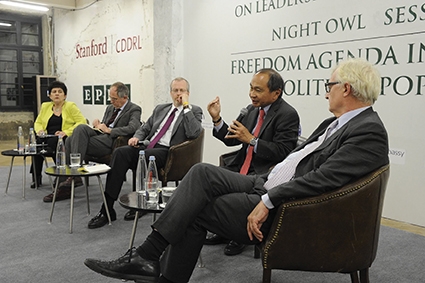Fukuyama on Putin, Misha & Bidzina
At the Leadership Academy for Development (LAD) forum last week, organized by the Economic Policy Research Center and Stanford University, Panorama TV show and GEORGIA TODAY seized the chance to have a quick chat with world famous political science expert and analyst, Francis Fukuyama. The man who so famously predicted (wrongly, as it turned out) the end of history and proclaimed the eternal reign of the liberal democracy, was more than happy to discuss the concept that seems to have dealt a severe blow to liberal democracies worldwide – Populism.
So, populism. An ambiguous concept, wouldn’t you agree? What’s, for example, the blurry line between populism and vox populi?
There is really no established definition of populism, that much is true. But I think the kind of movements that we’re seeing today in Europe and the United States is based on a very sharp and angry rejection of the political elite and elite policies, particularly related to globalization. It all comes together in a package where you get a single charismatic leader that promises these angry people some solutions that on the surface might be appealing but in the long run won’t help them. And all this because said leader has no intention or competence to put forward a working solution, a well thought-through policy. That’s how populism works today.
Let’s do some Georgian, real life case analysis: among our score of outspoken multimillionaires, we have Levan Vasadze, who is very much against liberal democracy and a staunch supporter of reinstating the monarchy. The polls at his TV appearance indicated 86 % support of his views from the viewer. Is that manipulation of people’s beliefs or what the bulk of Georgians really want?
I cannot directly comment on this particular gentleman, because I don’t know him. But one thing that’s happening is that there is a class divide – The elites and their voters come out of cities; they are younger, well-educated and tend to be cosmopolitan, while the base support for the populist leaders tends to be older people, less-educated, living in suburban areas. So, in a sense, some of the conspiracy theories and seemingly crazy ideas, like reinstating the monarchy, are things that appeal to people with less education. And the political entrepreneurs exploit it to attract attention and support. However, these crazy ideas are usually built on some grievance that is very real – poverty and lack of access to existing institutions in society. So, I think it’s very important for the policy makers to pay attention to these underlying issues and to try and do something about them rather than trying to go after the symptoms.
It’s always interesting to hear the views of prominent scholars on the great statesmen of modernity. So, to adjust our question to Georgian reality, what’s your opinion of: Vladimir Putin, Mikheil Saakashvili, and Bidzina Ivanishvili?
You know, I’m not sure I’d call any of them a statesman. Putin started out as a KGB agent and he is still a KGB agent. He’s nostalgic of the old Soviet Union and is doing everything in his power to recreate it in Russia. I think that Saakashvili is a much more interesting person, because he did some really good things. I think that the state modernization that he undertook after the Rose revolution was remarkably successful. His problem was power- the power went to his head and he misused it and that resulted in this big reaction that drove him out of said power. Ivanishvili doesn’t even pretend to be a politician, so it’s a little bit harder to think of him as a statesman in any way. It’s not a healthy system when you have somebody who is manipulating the political system from behind the scenes, because democracy is supposed to be about accountability, which means that I run for the office, I become Prime Minister or the President, I make decisions, and then, if people don’t like me, they can vote me out of power next time. I think that’s not the case in Georgia and that’s not a good system.
Vazha Tavberidze












